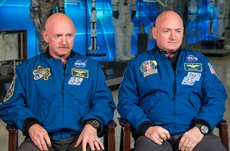Long stay in space could alter DNA, NASA’s Kelly twins study shows
10 Mar 2018
It seems that a prolonged stay in outer space could alter one's genetic structure. Astronaut Scott Kelly's DNA was altered by a year in space, results from NASA's Twins Study have confirmed.
 | |
| Astronaut twins Scott Kelly (left) and Mark |
The study was facilitated by the fact that Scott Kelly has a twin brother, Mark, also a retired astronaut.
Scott Kelly has spent 500 days in space overall, but a huge chunk of that came with a single mission which had him stay aboard the International Space Station for 342 days.
Seven percent of his genes did not return to normal after he landed, researchers found.
Scott Kelly's nearly one-year stint in space is "a stepping stone to a three-year mission to Mars," NASA reported. At present, astronauts only spend six months on the International Space Station as standard. A mission to Mars, however, could take three years.
Researchers studied Scott in space psychologically and physiologically, comparing his results to those of his earthbound brother. They looked at various proteins and evaluated the twins' cognition as part of the overall study. Ten research teams presented their preliminary findings last year at NASA's Human Research Program 2017 Investigators' Workshop (IWS). The recent 2018 IWS saw these findings confirmed. Researchers also presented data from Scott's time back on earth.
''Scott's telomeres (endcaps of chromosomes that shorten as one ages) actually became significantly longer in space,'' NASA said. ''While this finding was presented in 2017, the team verified this unexpected change with multiple assays and genomics testing. Additionally, a new finding is that the majority of those telomeres shortened within two days of Scott's return to Earth.''
The researchers linked space travel to oxygen deprivation stress, increased inflammation and striking nutrient shifts that affect gene expression. Some of these changes went back to normal within hours of landing on earth. A few, however, still affected Scott six months after his return.
After landing, 93 per cent of Scott Kelly's genes returned to normal, the researchers found. The altered 7 per cent, however, could indicate long-term changes in genes connected to the immune system, DNA repair, bone formation networks, oxygen deprivation and elevated carbon dioxide levels.
The individual studies on the twins will be combined into a summary paper, set to be released later this year. The research will inform NASA's understanding of the human body in space for "years to come", the agency reported, as it "continues to prioritize the health and safety of astronauts on spaceflight missions".
''I did read in the newspaper the other day that 7 per cent of my DNA had changed permanently,'' Kelly said in a recent interview. ''And I'm reading that, I'm like, 'Huh, well that's weird'.''
The ''Twins Study'' was a preliminary step in the lead-up to an eventual long-haul manned mission to Mars. NASA has plans in place for such a mission, but they are not concrete as it is currently working on the technology to actually make that happen.
And the human element cannot be overlooked. A Mars mission would last as long as three years, which would obviously be the longest stretch that any human has been away from earth. Can the human body handle such a journey? We might not have too long to find out, as some are expecting the first manned Mars trip to happen as soon as the 2030s.



















